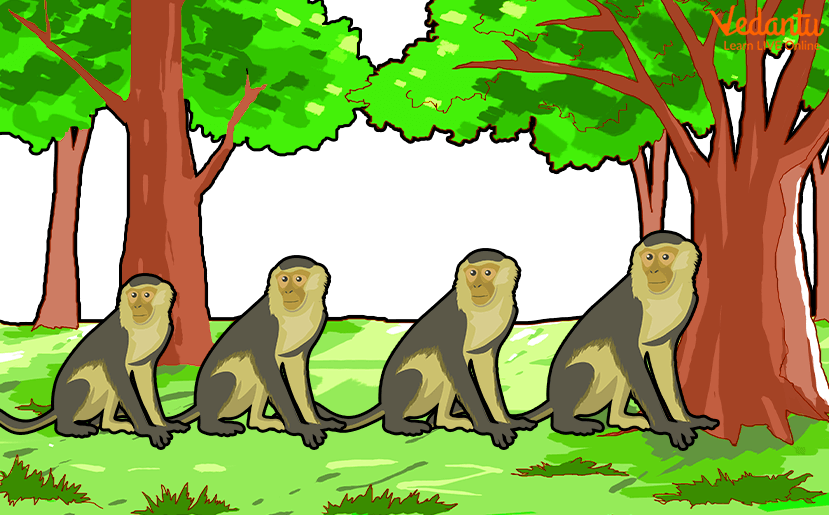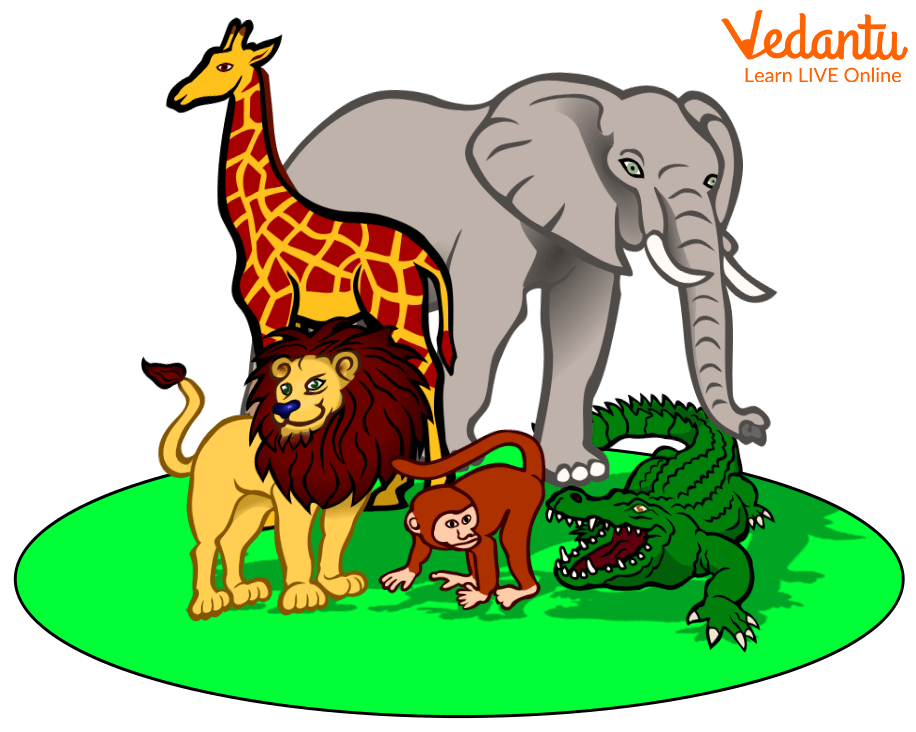




Why Are Monkeys So Unique? Fun Insights for Young Learners
Monkeys are intelligent, social animals. They are members of the primate group of mammals, which includes apes and humans. There are approximately 200 different species of monkeys. Scientists classify them as old world monkeys or new world monkeys. Baboons, drills, mandrills, macaques, guenons, langurs, and colobus monkeys are examples of old world monkeys. Keep reading to learn more facts about monkeys.

Monkey
Features of Monkeys
Monkeys frequently have smiles on their faces, leaving onlookers to wonder what they are up to. Like humans, monkeys have a distinct set of fingerprints of their own. This is really intriguing and provides more evidence that all primates, including ours, are closely connected to one another.

Monkey Lives in the Tree
Characteristics of Monkeys
Monkey, any one of the Old World monkeys or the New World monkeys, two subspecies of tropical anthropoid primates. The majority of species are diurnal and tropical or subtropical. The majority of species leap from tree to tree utilising all four limbs. They can stand and sit straight. Instead of swinging arm in arm like the apes, most species run along branches. Monkeys are highly social omnivores that live in groups of up to several hundred people under the leadership of an elderly male.
Monkey Facts
Monkey is a familiar name for a group of primate mammals.
They live both on the ground and in the trees.
Most monkeys have tails.
Apes are not monkeys.
Groups of monkeys are known as a mission, tribe, or troop.
They have to stay away from animals like big snake, crocodiles, and leopards.

Monkey Troops
Fun facts about Monkeys
Just like young children, monkeys have a high IQ.
Illnesses can be spread to people by monkeys.
The owl monkey's more enduring moniker is the "night monkey."
Monkeys and apes are not the same but are related.
To interact with one another, monkeys engage in grooming rituals.
Monkeys as pets are popular exotic animals.
All monkeys have opposable thumbs.
The common cold does not affect monkeys.

Fact About Monkeys
GK Facts about Animals
The most prominent member of their kind, tigers, are members of the cat family.
There are more than 400 million dogs worldwide.
Dolphins communicate by whistling, clicking, and making other noises.
A male giraffe at full maturity can weigh up to 1400 kilos.
A camel can live between 40 and 50 years.
Over 470 million dogs are in the world.
Cats can't taste anything that is sweet.
Owls can't move their eyeballs.
Kangaroos can't walk backwards.
The only animal that can't jump is Elephant.
Sharks don't have bones.

Facts of Animals
Summary
Monkeys are well-known for giving good care to the young and even expressing some humanistic behaviours. Monkeys are extremely noisy creatures, and here is how they communicate with one another. They use a variety of pitches to warn each other of danger, call a mate, and even talk to their young.
Sample Questions
1. Where do the monkeys live?
trees b) den c) kennel
Ans: a) trees
2. What do monkeys like to eat?
fish b) banana c) orange
Ans: b) banana
3. What is the group of monkeys called?
bunch b) pride c) troop
Ans: c) troop
4. Monkeys have a long ________.
none b) tail c) arm
Ans: b) tail
FAQs on Fascinating Facts About Monkeys for Kids
1. What are some of the most surprising facts about monkeys for kids?
Here are a few simple and interesting facts about monkeys that are easy to understand:
- A group of monkeys is called a troop or a mission.
- Monkeys are found in two main groups: Old World monkeys (from Africa and Asia) and New World monkeys (from the Americas).
- Many New World monkeys have special tails called prehensile tails, which they can use like an extra hand to grab branches.
- The smallest monkey, the Pygmy Marmoset, is only about 5 inches tall!
2. How are monkeys different from apes?
The easiest way to tell monkeys and apes apart is by looking for a tail. Most monkeys have a tail, but apes (like gorillas, chimpanzees, and orangutans) never do. Also, monkeys are generally smaller and walk on all four limbs on top of branches, while larger apes often swing from branches with their arms.
3. What do monkeys typically eat?
Most monkeys are omnivores, which means they eat a mix of plants and small creatures. Their diet often includes fruits, leaves, seeds, and nuts. They also eat insects, bird eggs, and small lizards. While they famously love bananas, their natural diet is much more varied.
4. Why are monkeys so good at climbing and moving through trees?
Monkeys are excellent climbers because of their unique bodies. They have strong, flexible hands and feet that can grip branches firmly. Many monkeys also use their long tails for balance, almost like a tightrope walker's pole. Some can even use their tail to hold onto a branch while they reach for food with their hands.
5. How do monkeys communicate with each other?
Monkeys use a combination of sounds, facial expressions, and body language to communicate. They make loud calls to warn their troop of danger, use softer sounds to interact with family, and show feelings like happiness or anger through their faces. This complex communication helps them survive and live together in social groups.
6. Do monkeys build nests to sleep in?
No, monkeys do not build nests. They typically sleep in trees, huddling together on sturdy branches for warmth and safety. It's the great apes, like chimpanzees and gorillas, that are known for building new nests out of leaves and branches each night to sleep in.
7. Where do most monkeys live?
Most monkeys live in the warm climates of Asia, Africa, and Central and South America. Their primary habitats are forests and jungles, where they can find plenty of food and trees to live in. However, some species have adapted to live in grasslands or even mountainous areas.









